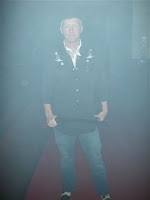
Do you think that you would drum better if you played using a click track as backup? Have you ever tried to record using a click track? Have you ever brought it to rehearsal, thinking that it would work in a live situation? It's not easy to keep time if you don't practice with one, so starting something new like using a metronome, (while under the pressure of laying down a great recording,) falls short when you don't do the homework.
Let the Click Track Guide You
I find that I do my best recording with a click track when I admit that the machine is keeping time for the song, and I'm just grooving along with it. The pressure to be on time during any session is already intense. How can I let that pressure go? I just think to myself that the click in my headphones is running the show, and I'm there to hit the mark while having a great time. Keep time, but realize that the click track is going to be perfect. You are human and will not be perfect. Stay on top of the click, and enjoy the ride.
Practice with a Click Track
Nothing is worse than playing "speed up and slow down" when you find yourself off time. In fact, if I have the kill switch within reach during a song and my timing is lost, I'll turn off the click track and plod on. That specific track might be spliced up, or your first two minutes of that track could be pasted to the last half of a better take if you are playing along to a click. The timing will be there for the engineer to work with. Staying in time with a click requires lots of practice. I don't just play 4/4 beats to the track, I do my warm up exercises with a click in the background. I tend to set the the beat to 8/8 for a 4/4 song. The extra notes keep you in line.
Many Recordings Require a Perfect Tempo
When your band mate writes a song that opens with four bars of just guitar, how are you going to hit your mark when you need to come in? If the song drops out in the middle and then comes crashing back in, how will you know when to start back up? If the studio is using any type of modern recording software, the tracks will most certainly be mapped out according to time. It's pretty much a "must do" unless your entire band is playing live.
Let the Engineer Help You with a Click Track Decision
I will admit that there have been times in my career when the studio engineer makes a call against using a click track. If the song is structured properly, and the engineer is quite confident that he or she can get a good take from me, then I defer to their judgement. In fact, I can think of specific recordings where I asked for a click track, and was told to try it a few times without. If things didn't work out, they would have me start again with a guide. As long as you don't get bogged down trying to fix the tempo during the mixing phase, you might find that there is a natural feel to a song that may speed up a tad.


